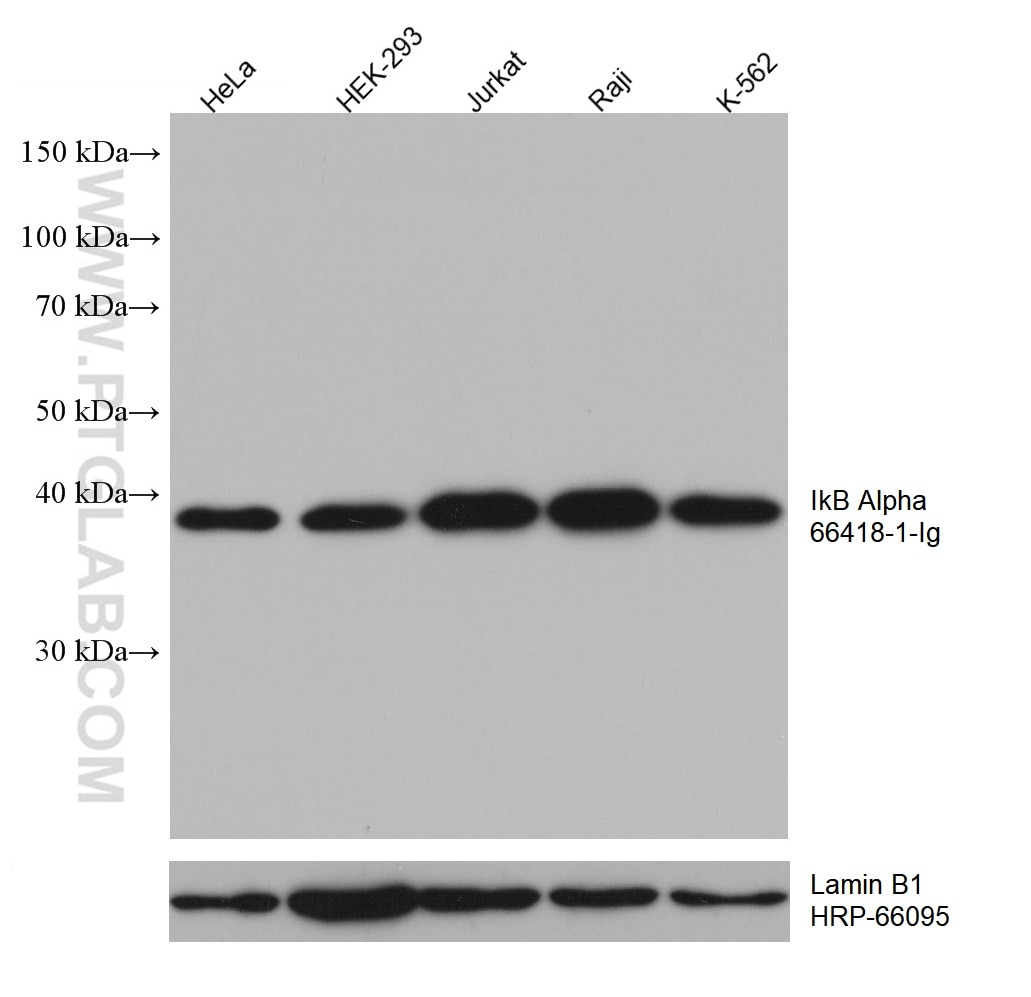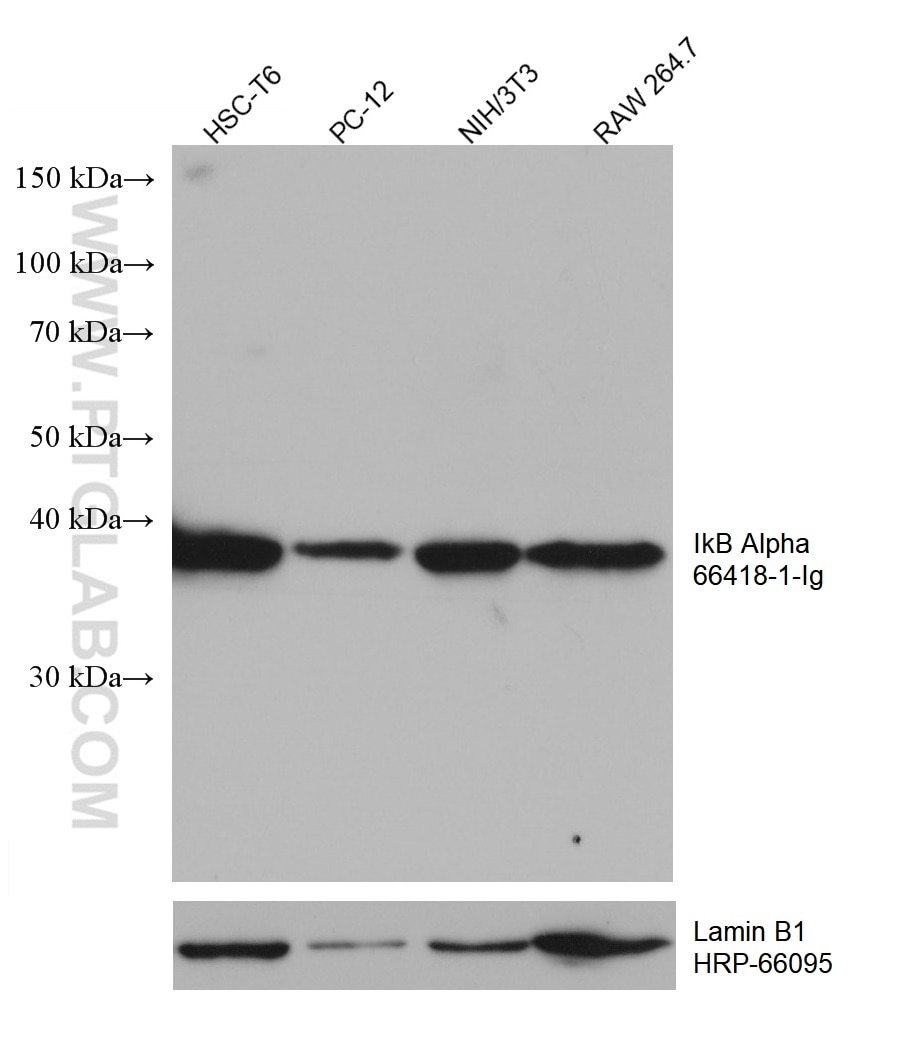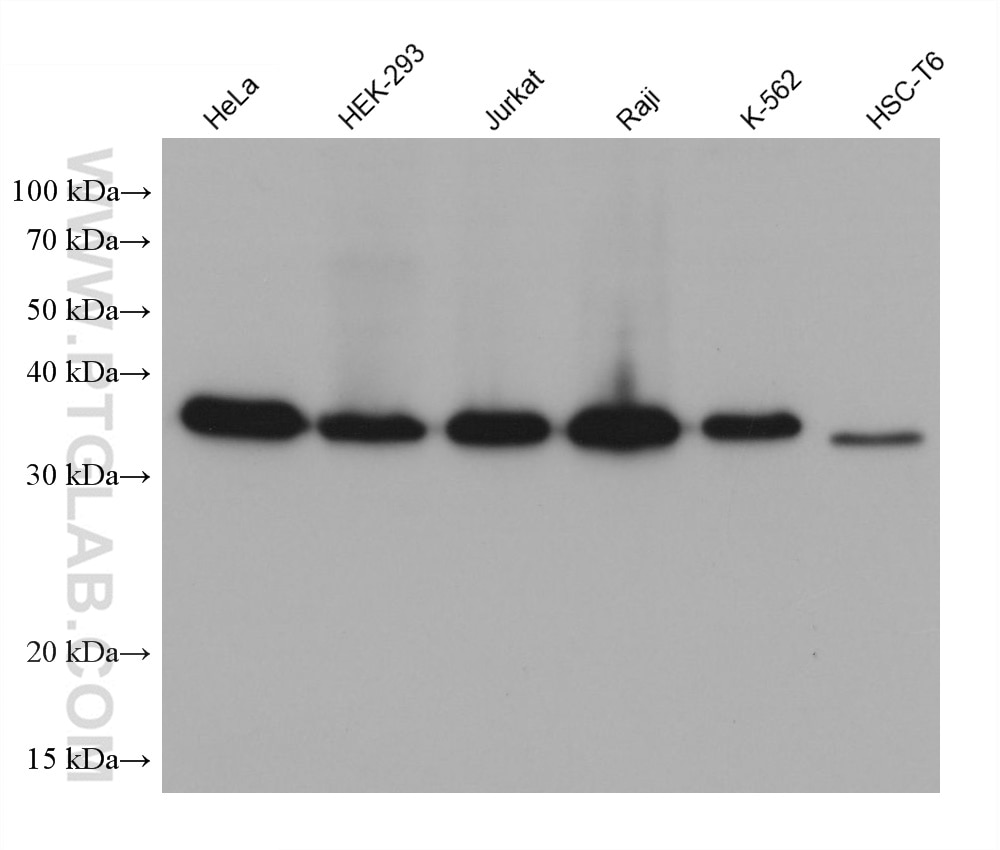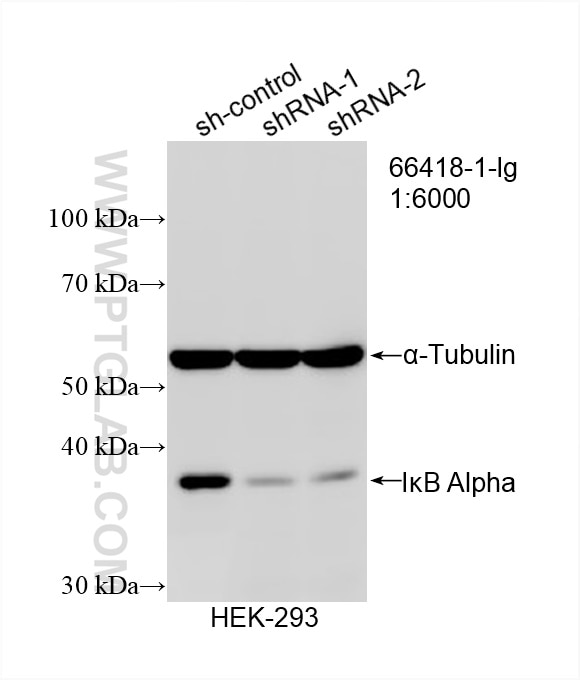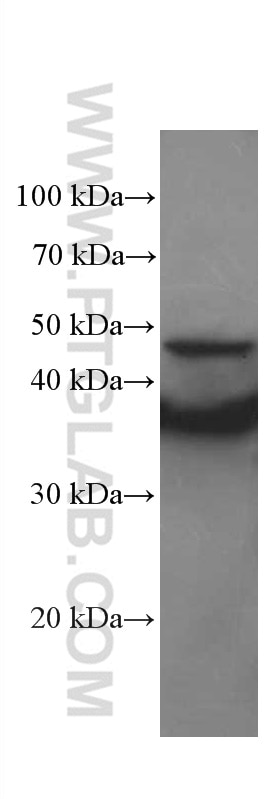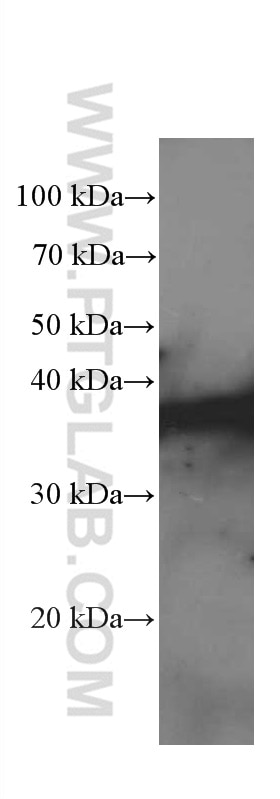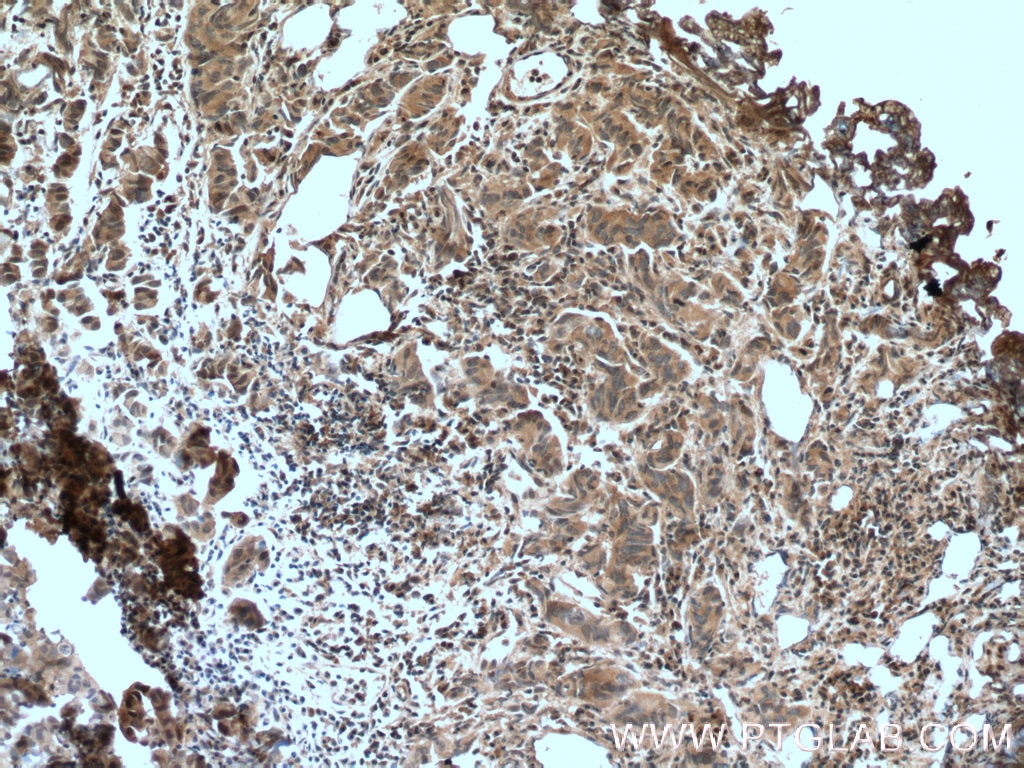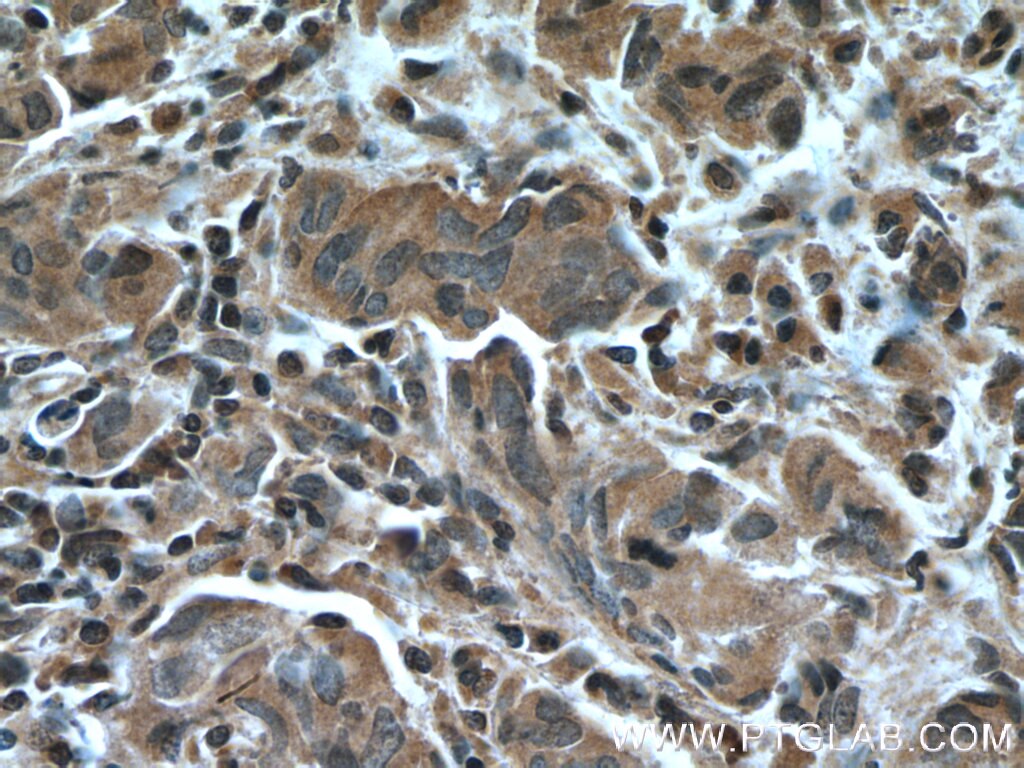- Featured Product
- KD/KO Validated
IkB Alpha Monoklonaler Antikörper
IkB Alpha Monoklonal Antikörper für WB, IHC, ELISA
Wirt / Isotyp
Maus / IgG1
Getestete Reaktivität
human, Maus, Ratte und mehr (1)
Anwendung
WB, IHC, IF, ELISA
Konjugation
Unkonjugiert
CloneNo.
2G6H7
Kat-Nr. : 66418-1-Ig
Synonyme
Geprüfte Anwendungen
| Erfolgreiche Detektion in WB | HeLa-Zellen, C6-Zellen, HEK-293-Zellen, Jurkat-Zellen, K-562-Zellen, NIH/3T3-Zellen, PC-12-Zellen, Raji-Zellen, RAW 264.7-Zellen, ROS1728-Zellen |
| Erfolgreiche Detektion in IHC | humanes Prostatakarzinomgewebe Hinweis: Antigendemaskierung mit TE-Puffer pH 9,0 empfohlen. (*) Wahlweise kann die Antigendemaskierung auch mit Citratpuffer pH 6,0 erfolgen. |
Empfohlene Verdünnung
| Anwendung | Verdünnung |
|---|---|
| Western Blot (WB) | WB : 1:5000-1:50000 |
| Immunhistochemie (IHC) | IHC : 1:50-1:500 |
| It is recommended that this reagent should be titrated in each testing system to obtain optimal results. | |
| Sample-dependent, check data in validation data gallery | |
Veröffentlichte Anwendungen
| WB | See 39 publications below |
| IF | See 2 publications below |
Produktinformation
66418-1-Ig bindet in WB, IHC, IF, ELISA IkB Alpha und zeigt Reaktivität mit human, Maus, Ratten
| Getestete Reaktivität | human, Maus, Ratte |
| In Publikationen genannte Reaktivität | human, Hausschwein, Maus, Ratte |
| Wirt / Isotyp | Maus / IgG1 |
| Klonalität | Monoklonal |
| Typ | Antikörper |
| Immunogen | IkB Alpha fusion protein Ag22040 |
| Vollständiger Name | nuclear factor of kappa light polypeptide gene enhancer in B-cells inhibitor, alpha |
| Berechnetes Molekulargewicht | 36 kDa |
| Beobachtetes Molekulargewicht | 36 kDa |
| GenBank-Zugangsnummer | BC004983 |
| Gene symbol | IkB Alpha |
| Gene ID (NCBI) | 4792 |
| Konjugation | Unkonjugiert |
| Form | Liquid |
| Reinigungsmethode | Protein-A-Reinigung |
| Lagerungspuffer | PBS with 0.02% sodium azide and 50% glycerol |
| Lagerungsbedingungen | Bei -20°C lagern. Nach dem Versand ein Jahr lang stabil Aliquotieren ist bei -20oC Lagerung nicht notwendig. 20ul Größen enthalten 0,1% BSA. |
Hintergrundinformationen
Nuclear factor of kappa light polypeptide gene enhancer in B-cells inhibitor, alpha (NFKBIA, synonyms: IKBA, MAD-3, NFKBI). NFKB1 or NFKB2 is bound to REL, RELA , or RELB to form the NFKB complex. The NFKB complex is inhibited by I-kappa-B proteins (NFKBIA or NFKBIB), which inactivate NF-kappa-B by trapping it in the cytoplasm. Phosphorylation of serine residues on the I-kappa-B proteins by kinases (IKBKA, or IKBKB) marks them for destruction via the ubiquitination pathway, thereby allowing activation of the NF-kappa-B complex. Activated NFKB complex translocates into the nucleus and binds DNA at kappa-B-binding motifs such as 5-prime GGGRNNYYCC 3-prime or 5-prime HGGARNYYCC 3-prime.
Protokolle
| PRODUKTSPEZIFISCHE PROTOKOLLE | |
|---|---|
| WB protocol for IkB Alpha antibody 66418-1-Ig | Protokoll herunterladen |
| IHC protocol for IkB Alpha antibody 66418-1-Ig | Protokoll herunterladenl |
| STANDARD-PROTOKOLLE | |
|---|---|
| Klicken Sie hier, um unsere Standardprotokolle anzuzeigen |
Publikationen
| Species | Application | Title |
|---|---|---|
Acta Biomater An injectable co-assembled hydrogel blocks reactive oxygen species and inflammation cycle resisting myocardial ischemia-reperfusion injury. | ||
Mol Ther Nucleic Acids TAZ ameliorates the microglia-mediated inflammatory response via the Nrf2-ROS-NF-κB pathway. | ||
Bioengineered Calcium-activated nucleotides 1 (CANT1)-driven nuclear factor-k-gene binding (NF-ĸB) signaling pathway facilitates the lung cancer progression | ||
Int Immunopharmacol OSU-T315 overcomes immunosuppression in triple-negative breast cancer by targeting the ILK/NF-κB signaling pathway to enhance immunotherapeutic efficacy | ||
J Ethnopharmacol Buyang Huanwu Decoction suppresses cardiac inflammation and fibrosis in mice after myocardial infarction through inhibition of the TLR4 signalling pathway | ||
Foods Gastroprotective Effects of the Aqueous Extract of Finger Citron Pickled Products against Ethanol-Induced Gastric Damage: In Vitro and In Vivo Studies |
